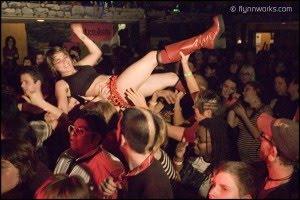Decibelle (10/15 -10/18/2009)

The Decibelle Music & Culture Festival was a mixed bag, so I’m going to break it down for you, Clint Eastwood style.
The Good
Me'Shell Ndegeocello is a blessing. My plus-one and I attended her 10 p.m. show at the Old Town School of Folk Music in Lincoln Square, an intimate venue with pews and cafe tables for seats and acoustics that are great for folk music. We walked in during Deep Blue Field, the opening act, which featured cello, violin, a DJ, and projected images. A lot of it was really beautiful, but most of the audience was in a coma by the time they got off the stage. I believe this was part of the intended effect; regardless, it was a nice change from fighting the weather. When the lights came up, the audience's reaction included confusion and lot of murmuring about coffee. Thankfully, The School has a full bar.
The mood change completely when Ndegeocello entered. Small in stature with short hair and giant glasses, she’s powerhouse of a woman with a big smile. She opens her mouth, picks up the bass, and out pours this gorgeous husky voice with a delicate lilt to the upper register. Ndegeocello performed old favorites, as well as songs from her new album Devil’s Halo. Her songs are driving and hard: even the love songs are tough, so much so that it seemed like the venue's system wasn't equipped to handle her sound. However, she had the audience so wrapped up in her music that few people cared.
Sister Spit: The Next Generation was also really great, once it got going. Appearing in this incarnation as a part of Women and Children First’s Sappho Salon Series for lesbians and their friends, Sister Spit is, as Decibelle explains, a queer “literary road show.” Co-founder Michelle Tea hosted a lively evening of fiction and humor, including painfully funny comics by Ariel Schrag and a novel about transgendered teens squatting in San Francisco.
The Bad
The pre-party on Thursday night at Berlin was not so great. In fact, I'd say it was gross. We arrived around 10:30 p.m., and after convincing the door person we were supposed on a list, my guest and I cozied up next to the bar, each with an aptly named promotional “mini-tini” and in close proximity to a giant jar of condoms. As the patrons trickled in, I started to think about life's difficult questions. Would my guest look as good in a high school wrestling uniform as the mustachioed bartender did? Should I start wearing more vests? Did that girl swinging her girlfriend in the air know how close the swingee's boot came to my face? Is it punishment enough that both are now pole dancing with a very real lack of rhythm in front everyone? Why hadn't I seen any of the DJs Decibelle's website had described using many exclamation marks and comparisons to Bjork? An hour and a half into the party, there was no sign of the Chicago debut of Emilie Simon, so we headed out.
The Ugly
The ugliest part of the Chicago festival was Chicago itself. The weather was classic: a painful mix of sleet and rain that felt terrible and messed with travel times for every form of transit in the city. Then, the Chicago Transit Authority in its infinite wisdom began construction on the Red Line, a primary artery of north-south transportation. Between the weather and the CTA, travel times between events tripled for both train riders and drivers. I was late to events, missed the Heartland Cafe's Music Lounge, took hours to get home after late nights, and was in such a surly state I wasn't willing to travel back down to Andersonville for the Saturday night after-party at Ole Ole.
Compounding the irritation of the weather and the transit were the organizational issues of the fest. Of the venues I attended, only the Old Town School seemed to know I was coming and didn't require several minutes of arguing at the door. The Berlin party consisted mostly of waiting. The Decibelle website and Women and Children First had different ideas about when Sister Spit started, so I chose the earlier time and wound up sitting around for half an hour waiting for the reading to start. This would have been fine if there weren't another event going on at the same time, which, as I mentioned earlier, I couldn't catch the end of because of the train.
The Future
I supposed one could argue that logistical issues are just part of the package when you're dealing with the arts, but it doesn't need to be the case. Most of these issues could have been avoided by improved communication between the festival organizers, promoters, and venues. In addition, I don't know that the spreading the events over a four neighborhoods had the intended effect, which I assumed was a cross-pollination of feminist communities. For the most parts, the boys stayed in Boystown for the dance party, the girls stayed in Andersonville at the bookstore, and the patrons of color stayed west of Western Avenue for the soul music. The lack of crossover was disappointing and points to Chicago's long history of segregation. I wish I had been able to make it back up to Rogers Park, one of the city's most diverse neighborhoods, to see how things shook out at the Heartland.
Despite these issues, the festival shows a lot of promise. Ndegeocello and Sister Spit were well worth the hassle; both of these events featured women who challenge ideas of gender in positive ways, and their intersection provided a space for thought about what it means to be a feminist.